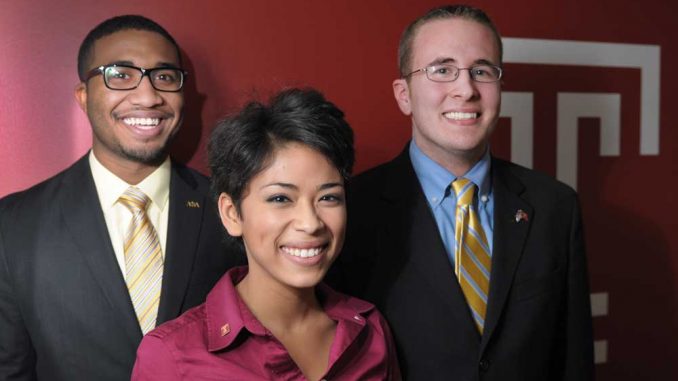
Temple United’s main platform points are making Owl Cards a form of SEPTA payment, improving the stars and diamonds program, implementing a Food Recovery Network and helping students graduate in four years by improving academic services.
Candidate for student body president Darin Bartholomew is joined by candidate for vice president of services Cree Moore and candidate for vice president of external affairs Sonia Galiber. Together, they make up the Temple United ticket.
“Our ticket name is Temple United for a reason,” Galiber said. “We cover such a large and broad demographic. I am from out of state, Cree is from the city and Darin is from in-state, and we come from such varying organizations.”
“Despite all these differences we have, I continue to be blown away by how functional and how much we’ve been able to build this well-oiled machine,” she said.
One of the main points on Temple United’s platform is working with SEPTA to accept the university identification cards as a proper form of payment. The current Owl Cards contain radio frequency identification technology and would be compatible with SEPTA’s new contact-less payment program, ticket members said.
“We have a 20,000-plus population that uses SEPTA heavily, Temple is one of the largest employers in the region, and we have a very large base of people and students that have become life-long SEPTA users. We need to use that as leverage for SEPTA to come to the bargaining table and make that happen,” Bartholomew said.
Bartholomew, a junior management information systems major, is currently TSG director of government affairs, and said he plans to help the university students graduate in four years by advocating for more online and hybrid summer classes and less restrictions on transfer credits.
“Say you are from out of state and you go home for the summer and want to take a summer class, it should be able to easily transfer back into Temple. We need to make sure it is not a difficult process,” Bartholomew said.
Temple United has said it’s building a platform that would benefit both current and future students.
“It would be selfish to think about the students that are here and not the future students to come. Even though we want to get votes from the students, most definitely, but at the same time we are not just thinking about the time we are in office,” Moore said.
Galiber said she has plans to improve the relationship with the North Philadelphia community through the continuance of the Adopt-a-Block program and transitioning the university to become a Food Recovery Network.
The Food Recovery Network, started at University of Maryland, would take the leftover perishable food on campus and donate it to charitable organizations in the neighborhood.
“It alleviates two issues that are key in the area: hunger and food waste,” Galiber said.
Galiber is a junior political science major who serves as president of the Japanese Conversation Club and was the liaison between the Obama campaign and Temple College Democrats during the 2012 election.
Galiber is the only candidate on the Temple United ticket that does not have previous TSG experience, but Galiber and Bartholomew said they don’t believe that it’s a weakness.
“I am not as familiar with a lot of the intricate workings of TSG like Cree and Darin are, but they have taught me everything I needed to know along the way. I don’t feel underprepared by any means because of my lack of experience with TSG in the past,” Galiber said.
Bartholomew said he asked Galiber to become his running mate because of her experience with Temple College Democrats and experience with President Barack Obama’s 2012 election campaign.
“We thought she would be a good person for external affairs, because she is really in touch with what is going on in the outside world,” Bartholomew said.
Galiber also has plans to work with the university to create a more accurate record of where students are living off campus to help evaluate the current campus boundaries that Temple Police and Philadelphia Police patrol.
In contrast to Galiber’s role, Moore will focus more on the internal workings of the university and has goals to redesign the stars and diamonds program.
“All of us, from being in different organizations, understand the difficulty of the stars and diamond programs,” Moore said. “We want to make it an easier way for you to turn in information and for it to be updated weekly.”
Moore said he plans to eliminate a portion of the mandatory workshops and reward organizations more for the community service and work it completes.
Moore is a junior mechanical engineering major, current TSG director of recruitment and retention and brother of the Alpha Phi Alpha fraternity.
Laura Detter can be reached at laura.detter@temple.edu.


Be the first to comment